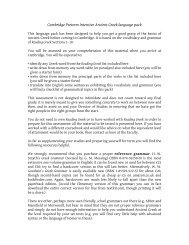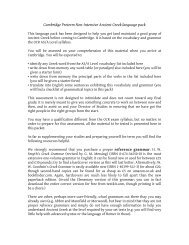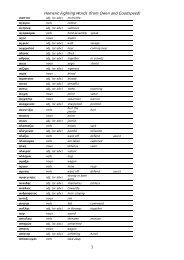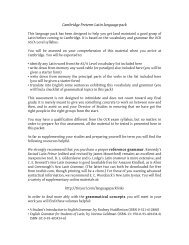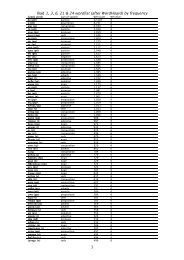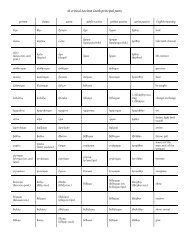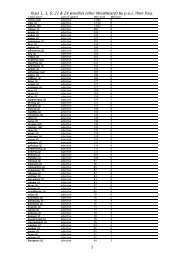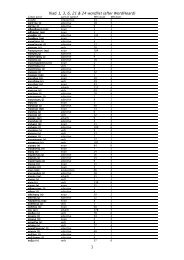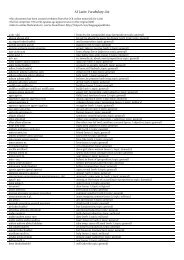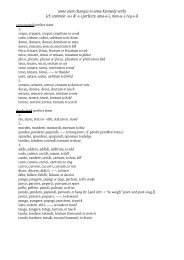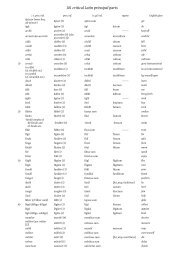Lexicon for Iliad 1, 3, 6, 21 & 24 (draft) 1 - CW's language page
Lexicon for Iliad 1, 3, 6, 21 & 24 (draft) 1 - CW's language page
Lexicon for Iliad 1, 3, 6, 21 & 24 (draft) 1 - CW's language page
You also want an ePaper? Increase the reach of your titles
YUMPU automatically turns print PDFs into web optimized ePapers that Google loves.
<strong>Lexicon</strong> <strong>for</strong> <strong>Iliad</strong> 1, 3, 6, <strong>21</strong> & <strong>24</strong> (<strong>draft</strong>)<br />
killer, po/tmon e)fei=nai, or of the killed, po/tmon e)pispei=n, Hom.;—also in Pind. and Trag. • without a sense of evil, p.<br />
suggenh/s one's natural gifts, Pind.;eu)tuxei= po/tmw| Aesch.;p. cunh/qhs patro/s my father's customary <strong>for</strong>tune, Soph. •<br />
(Penult. often short in Trag.)<br />
ποτνια po/tnia, hs, h(, • (from same Root aspo/sis, despo/ths) • a poet. title of honour, used chiefly in addressing goddesses or<br />
ladies: • potens ferarum, Il.;po/tnia bel/ewn Pind.: absol., po/tni' *)erinu/s Aesch.; often in voc., w)= po/tni' *(/hra<br />
Aesch.;w)= po/tnia (sc.*)aqhnai/a) Ar.:—in pl. of the Eumenides, Hdt., Soph.; also of Demeter and Proserpine, Soph.,<br />
etc. • as adj. revered, august, Hom.<br />
που anywhere, somewhere, Hom., etc.; often with other Advs. of Place, ou)x e(ka/s pou somewhere not far off, Soph.;pe/las<br />
pou Soph.;a)/lloqi/ pou Dem.:—c. gen., a)lla/ pou au)tou= a)grw=n in some part there of the fields, Od.;ei)/ pou th=s<br />
xw/ras tou=to sune/bh Dem. • also without reference to Place, in some degree, kai/ pou/ ti Thuc.:—often to qualify an<br />
expression, anyway, possibly, perhaps, I suppose, I ween, Hom., etc.;ei)/ pou, e)a/n pou, ei) mh/ pou Xen.;ti/ pou . . ;<br />
what in the world? Aesch.;with numerals, de/ka kou about ten, Hdt.:— ou)/ ti/ pou denies with indignation or wonder,<br />
surely it cannot be, Soph., etc.; whereasou) dh/pou adds a suspicion that it is so, ou) dh/pou *stra/twn; Ar.<br />
που (properly a gen. of*po/s quis) • ubinam terrarum? Aesch., etc.; so, pou= pot' ei)= frenw=n; Soph.;pou= gnw/mhs ei)=;<br />
Soph..; pou= tu/xhs; at what point of <strong>for</strong>tune? Soph. • of manner, how? Eur.; to express an inference very strongly, kou=<br />
ge dh\ . . ou)k a) xwsqei/h ko/lpos . . ; how then would it not . . ? i. e. it certainly would . . , Hdt.; also in Trag., in indignant<br />
questions, how? by what right?pou= su\ ma/ntis ei) sofo/s; Soph.<br />
πους pes, pedis, Hom., etc.; in pl., also, a bird's talons, Od.; the arms of a polypus, Hes.;cu/linos p., of an artificial foot, Hdt.:<br />
phrases in respect to the footrace, perigigno/meq' a)/llwn po/dessin, to be better than others in running, Od.;posi e)ri/zein to<br />
race on foot, Il.;posi\ nika=n, a)e/qlia possi a)/ronto Hom.:—the dat. posi/ is added to all kinds of Verbs denoting motion,<br />
posi\ bh=nai, dramei=n, o)rxei=sqai, etc.; <strong>for</strong>po/da bai/nein, v.bai/nw A. II. 3:—metaph., no/stimon nau=s e)ki/nhsen po/da<br />
started on its homeward way, Eur. • as a mark of close proximity, pro/sqen podo/s orpodw=n, propa/roiqe podw=n just<br />
be<strong>for</strong>e one, Hom.;pa podi/ close at hand, Pind.; but, para/ orpa podo/s off-hand, at once, Theogn.:—so, para\ po/da in a<br />
moment, Soph.;para\ po/das Plut.:— e)n posi/, likee)mpodw/n, close at hand, Hdt., Attic;ta\ pro\s posi/ Soph.:—these<br />
phrases are opp. toe)k podw=n, out of the way, far off, Hdt. (cf. e)kpodw/n). • e vestigio, Hdt., Attic; c. gen. pers.,<br />
kata\ po/das tinos e)/rxesqai, i)e/nai to come close at his heels, Hdt. • pedetentim, Xen. • peri\ po/da, properly of a shoe,<br />
round the foot, i. e. fitting exactly, Theophr., Luc. • w(s podw=n e)/xei as he is off <strong>for</strong> feet, i. e. as quick as he can, Hdt. •<br />
e)/cw tino\s po/da e)/xein to have one's foot out of a thing, i. e. be clear of it, e)/cw komi/zou phlou= po/da<br />
Aesch.;phma/twn e)/cw po/da e)/xein Aesch.:—opp. toei)s a)/ntlon e)mbh=sai po/da, Eur. • to denote energetic action,<br />
a)mfoi=n podoi=n, Ar.;bohqei=n podi\ kai\ xeiri\ kai\ pa/sh| duna/mei Aeschin.; <strong>for</strong>o)rqw=| podi/, v.o)rqo/s II. • pou/s tinos,<br />
periphr. <strong>for</strong> a person, su patro\s molw podi/, i. e.su patri/, Eur.;parqe/nou de/xou po/da Eur.:—also, e)c e(no\s podo/s, i.<br />
e.mo/nos w)/n, Soph.;oi( a)f' h(su/xou p., i. e.oi( h(su/xws zw=ntes, Eur. • pes montis, Il., etc. • in a ship, po/des are the<br />
lower corners of the sail or the ropes fastened thereto, the sheets, Od.;xala=n po/da to slack away or ease off the sheet,<br />
Eur.;tou= podo\s parie/nai to let go hold of it, Ar.;e)kpeta/sai po/da (with reference to the sail), Eur.: —opp. totei/nein po/da,<br />
to haul it tight, Soph.;nau=s e)ntaqei=sa podi/ a ship with her sheet close hauled, Eur. • a foot, as a measure of length, 4<br />
palms (palastai/) or 6 fingers, about 1/8 of an inch longer than our foot, Hdt., etc. • a foot in Prosody, Ar., Plat.<br />
πραξις pra=cis, ews, • (


